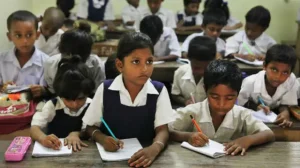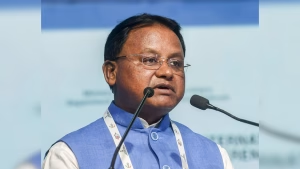Odisha – The Odisha government has introduced the ‘Sishu Vatika’ initiative under the National Education Policy (NEP) 2020 to strengthen early childhood education for children aged 5 to 6 in government schools. This initiative is designed to provide a structured and nurturing learning environment, ensuring a strong foundation for young learners as they begin their academic journey. With an emphasis on holistic development, Sishu Vatika aligns with the NEP 2020 framework to improve foundational literacy and numeracy.
The Importance of Early Childhood Education
Early childhood education plays a critical role in shaping cognitive, emotional, and social development. Research highlights that children who receive structured pre-primary education perform better in later academic stages. The NEP 2020 recognizes this and proposes significant reforms to ensure that young learners benefit from quality early education before entering formal schooling. The introduction of Sishu Vatika is an effort to bridge the gap between informal home learning and structured schooling.
Understanding the Sishu Vatika Initiative

Sishu Vatika aims to provide pre-school education within government schools, ensuring that children receive foundational literacy and numeracy training in a formal setting. By integrating pre-primary education into government schools, the initiative aims to prepare students for structured learning environments, minimizing the learning gap between different socio-economic groups.
The initiative follows a play-based learning approach, incorporating activities that help children develop cognitive, linguistic, and motor skills. These techniques align with global best practices in early childhood education, ensuring that children engage in meaningful learning experiences.
Objectives of Sishu Vatika
The primary objectives of Sishu Vatika include:
- Enhancing Early Childhood Education: Providing structured, quality pre-primary education for children aged 5-6, fostering early learning skills.
- Smooth Transition to Formal Schooling: Ensuring that children are well-prepared for primary education, reducing the risk of learning difficulties later on.
- Holistic Development: Promoting the physical, emotional, and cognitive growth of young learners through play-based and interactive learning methodologies.
- Equitable Education Access: Ensuring children from all socio-economic backgrounds have access to high-quality early childhood education.
Sishu Vatika: Implementation Strategy
Infrastructure Utilization
The initiative leverages existing infrastructure in government schools, converting designated spaces into age-appropriate learning environments. Classrooms are redesigned to include learning materials, play areas, and interactive tools that enhance the learning experience.
Teacher Training
Teachers play a crucial role in executing the Sishu Vatika initiative. The government has launched extensive training programs to equip educators with specialized skills in early childhood education. These training modules focus on:
- Activity-based learning methods
- Child psychology and behavioral development
- Effective storytelling and communication techniques
- Assessment strategies for young learners
Curriculum Development
The curriculum for Sishu Vatika follows NEP 2020 guidelines, emphasizing play-based and activity-based learning. Key elements of the curriculum include:
- Foundational literacy and numeracy
- Social and emotional learning
- Creative arts and expression
- Physical development through interactive play
Community Involvement
Parental and community involvement is encouraged to ensure children receive support both at home and in school. Schools conduct interactive sessions where parents learn about their child’s development and how they can contribute to their learning experience.
Alignment with NEP 2020


The NEP 2020 proposes a new 5+3+3+4 structure for the Indian education system. Sishu Vatika aligns with the first stage of this model, covering the foundational stage:
- Foundational Stage (ages 3-8): Includes three years of pre-primary education (such as Sishu Vatika) and classes 1-2.
- Preparatory Stage (ages 8-11): Classes 3-5.
- Middle Stage (ages 11-14): Classes 6-8.
- Secondary Stage (ages 14-18): Classes 9-12.
By implementing Sishu Vatika, the Odisha government is ensuring the successful execution of the foundational stage of NEP 2020, fostering an early learning culture in government schools.
Special Launch Events: Prabesh Utsav and Khadi Chhuan
To commemorate the launch of Sishu Vatika, Odisha organized two special events:
- Prabesh Utsav (Admission Festival): Schools welcomed young learners into their first learning space with engaging activities, making the transition to schooling enjoyable.
- Khadi Chhuan (Initiation into Writing): A symbolic event where children were introduced to the world of letters, marking the beginning of their formal education journey.
These programs helped create enthusiasm among students and parents, reinforcing the importance of early childhood education.
Also Read: Delhi Education Budget 2025: A Bold Rs. 19,291 Crore Investment for Schools
Expected Outcomes
The successful implementation of Sishu Vatika is expected to deliver significant benefits, including:
- Improved School Readiness: Children will enter formal education with strong foundational skills.
- Better Learning Outcomes: Early exposure to structured education enhances academic performance in later years.
- Reduced Dropout Rates: A positive introduction to schooling encourages long-term academic engagement.
- Increased Enrollment in Government Schools: Parents may prefer government schools over private alternatives due to quality early education initiatives.
Challenges and Considerations
While the initiative is promising, certain challenges need to be addressed to ensure its long-term success:
Resource Allocation
Sufficient funding and resources must be allocated to train teachers, develop learning materials, and maintain school infrastructure. The government will need to ensure sustained financial support for this initiative.
Monitoring and Evaluation
To measure the effectiveness of Sishu Vatika, regular monitoring and evaluation mechanisms must be established. This includes tracking student progress, assessing teacher performance, and gathering feedback from parents.
Awareness and Participation
Public awareness campaigns must be conducted to inform parents about the benefits of early childhood education and encourage higher participation rates in the program.
Future Prospects

The Odisha government aims to expand the reach of Sishu Vatika to cover all government schools, ensuring no child is left out of the foundational education framework. The initiative may serve as a model for other states looking to improve their early childhood education programs.
Additionally, digital learning tools and resources could be integrated into the curriculum to enhance the learning experience. By leveraging technology, the initiative can provide children with engaging, interactive, and personalized learning experiences.
Closing Remarks
Sishu Vatika under NEP 2020 is a landmark initiative in early childhood education, designed to strengthen the foundational learning stage in government schools. By focusing on holistic development, structured play-based learning, and community involvement, the initiative promises to reshape the education landscape for young learners in Odisha.
The success of Sishu Vatika depends on effective implementation, sustained resources, and collective efforts from educators, policymakers, parents, and the community. If executed well, it has the potential to create a significant impact, ensuring that every child receives the necessary skills and knowledge to excel in future academic pursuits.

